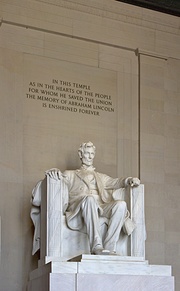Wikipedia:Honesty: Difference between revisions
Appearance
Content deleted Content added
Proabivouac (talk | contribs) rm "rationale" section as pointless rambling |
Proabivouac (talk | contribs) →Assume Good Faith: - blanked true but rambling and unnecessary section |
||
| Line 17: | Line 17: | ||
*'''Does''' proffer all relevant information to a discussion they know to be true, even when it might not support their argument. Withholding of information that contradicts other information, or filtering out data-points that do not match your assumptions, is dishonesty by omission. |
*'''Does''' proffer all relevant information to a discussion they know to be true, even when it might not support their argument. Withholding of information that contradicts other information, or filtering out data-points that do not match your assumptions, is dishonesty by omission. |
||
<!-- Quote seems not to fit the bullet point? [[Edmund Burke]] is famously mis-attributed as having said that "All that is necessary for the triumph of evil is that good men do nothing." Whoever the author, the sentiment is sound, and the applicability to the project is stark. --> |
<!-- Quote seems not to fit the bullet point? [[Edmund Burke]] is famously mis-attributed as having said that "All that is necessary for the triumph of evil is that good men do nothing." Whoever the author, the sentiment is sound, and the applicability to the project is stark. --> |
||
==[[WP:AGF|Assume Good Faith]]== |
|||
A foundation policy of Wikipedia is the concept of '''[[WP:AGF|Assume Good Faith]]'''. It has been the star we've steered by while navigating the rapids of disagreement. It has been the rivets that hold the policy frameworks together that we've constructed. But for the assumption of good faith to work, the corollary concept of '''Honesty''' must be adopted by all parties involved. |
|||
[[ko:위키백과:정직]] |
|||
Revision as of 09:17, 9 October 2008
| The following is a proposed Wikipedia policy, guideline, or process. The proposal may still be in development, under discussion, or in the process of gathering consensus for adoption. |
This is an explanatory essay about Error: No page specified. This page provides additional information about concepts in the page(s) it supplements. This page is not one of Wikipedia's policies or guidelines as it has not been thoroughly vetted by the community. |
| This page in a nutshell: Lying will hurt the project. |
| “ | It is wrong to lie to the community about anything. | ” |
| — --Jimbo Wales 18:00, 16 March 2007 (UTC) | ||

Honesty is a requirement of all processes of Wikipedia, including content discussion, the dispute process and all other functions of the community. Editors are reminded that while you may expect an assumption of good faith, this is based on the counter-assumption of honesty in your actions.
Honesty in actions
An honest Wikipedian:
- Does not say things they know to be untrue simply to support their argument.
- Does not cite sources they know to be unreliable. Trying to 'beat' a notability guideline, for example, by citing (as if it were a reliable source) a website that they know would not survive scrutiny, defeats the purpose of the guideline and serves as an end-run around the wishes of the community (as reflected by the written policies and guidelines).
- Does not misrepresent their personal background. The choice of anonymity is part of Wikipedia, but it is not a license to fabricate. Decline to share details you wish to keep secret, but when you begin to lie, both you and the project lose credibility.
- Does not argue in favor of something they think is wrong. WP:POINT is one of the most oft-cited and important real-world examples of this.
- Does not hide their personal point of view in order to pretend they don't have one. Conflicts of interests can only be assessed when users are honest about their motivations.
- Does proffer all relevant information to a discussion they know to be true, even when it might not support their argument. Withholding of information that contradicts other information, or filtering out data-points that do not match your assumptions, is dishonesty by omission.
